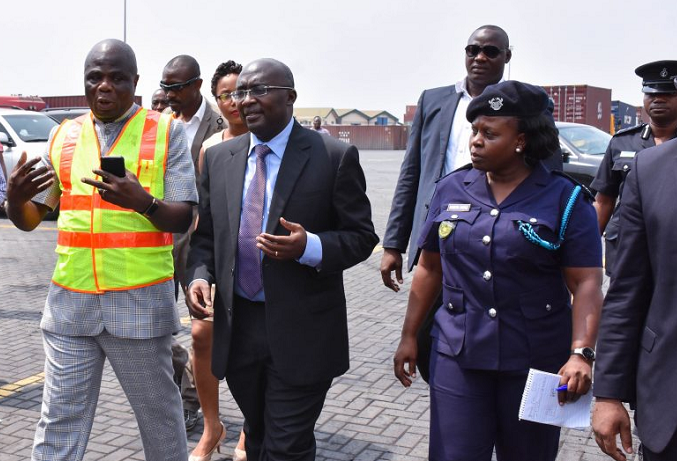The Vice-President, Dr Mahamadu Bawumia, has hinted that the government may ensure some standardisation in the exchange rate within the ports to ensure uniformity of tariffs.
According to him, although we were in a free market, some level of standardisation ought to be put in place to ensure that port charges, using foreign exchange rates, did not put people out of business.
“We have heard several complaints about unstable exchange rates, and while we may want a free market, we want to see harmonisation, where some level of standardisation is applied to all the market,” Dr Bawumia said.
The Vice-President made this known when he paid a surprise visit to the Tema Port yesterday.
The visit, he said, was to make the government understand issues concerning port business and examine the processes, so that they could be taken on board for policy formulation.
Operational areas
Dr Bawumia toured the various operational areas, such as the Golden Jubilee Terminal (GJT), the Document Verification Centre, popularly known as the Long Room, and the Atlas Holding yard where confiscated vehicles are kept.
He also called on the management of the Meridian Port Services (MPS) to apprise himself of the ongoing Tema Port expansion project.
He was conducted round the facility by the Director of Ports at the Ghana Ports and Harbours Authority (GPHA), Mr Jacob Adorkor, and some management staff of the authority.
Port improvement
Dr Bawumia indicated that Ghana’s ports were competing with other ports across the West African subregion, hence the need to ensure improved performance and efficiency across the board.
He pointed out that the importance of Ghana’s ports to its economy could not be underestimated.
Giving his impressions after the tour, the Vice-President indicated that the interaction with clearing agents, Customs officials, importers and other stakeholders suggested the need for improved performance.
“Customers are complaining about very high handling charges, import duties, duties on ambulances, outboard motors, among others, and we will work with stakeholders to ensure some level of comfort for the trading public,” he hinted.
He was of the view that the harmonisation of processes would ensure speedy port processes, hence the need to get first-hand information which would help the economic management team formulate policies in that direction.
Congestion
Dr Bawumia expressed worry over the seeming congestion at the various holding terminals within the port.
“I have seen a lot of vehicles piled up, taking up space. There are also mattresses, used fridges, among other goods, and it is important that we make people understand what import duties are, so they don’t ship items into the country and leave them unclaimed at the port terminals,” he said.
He proposed the need for a common website where importers could periodically check on import duty costs to inform their shipping decisions.

